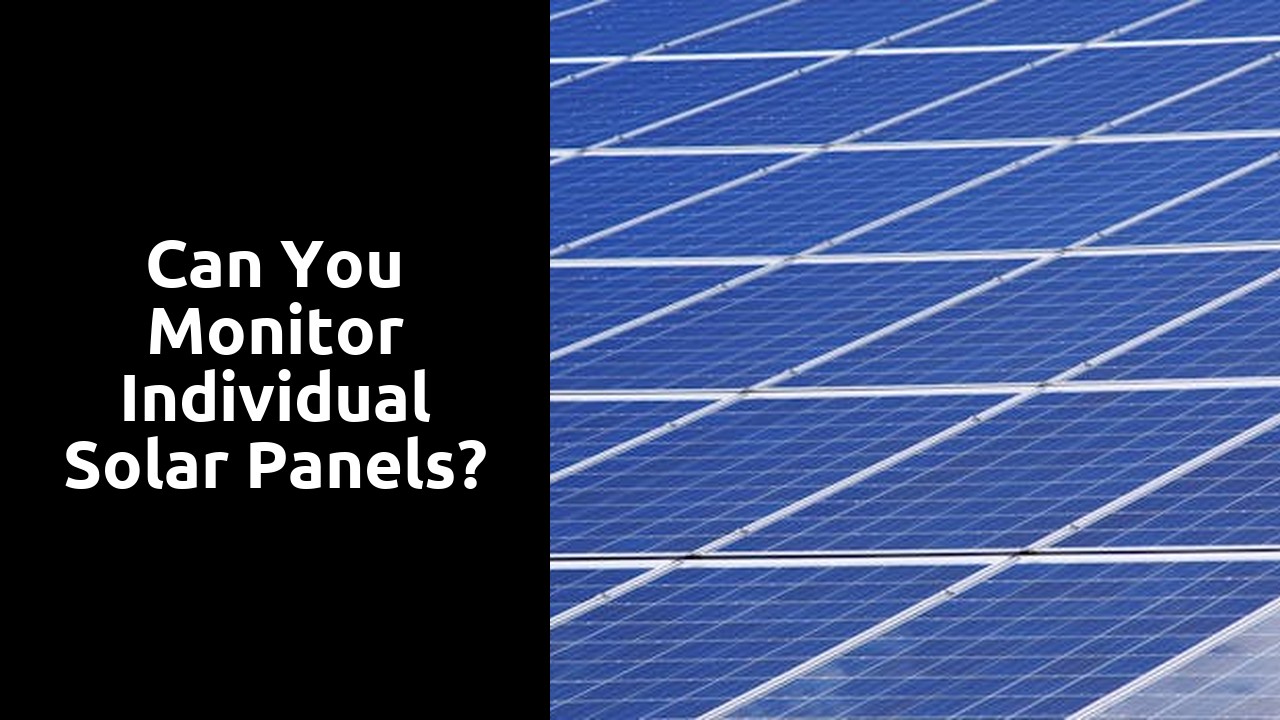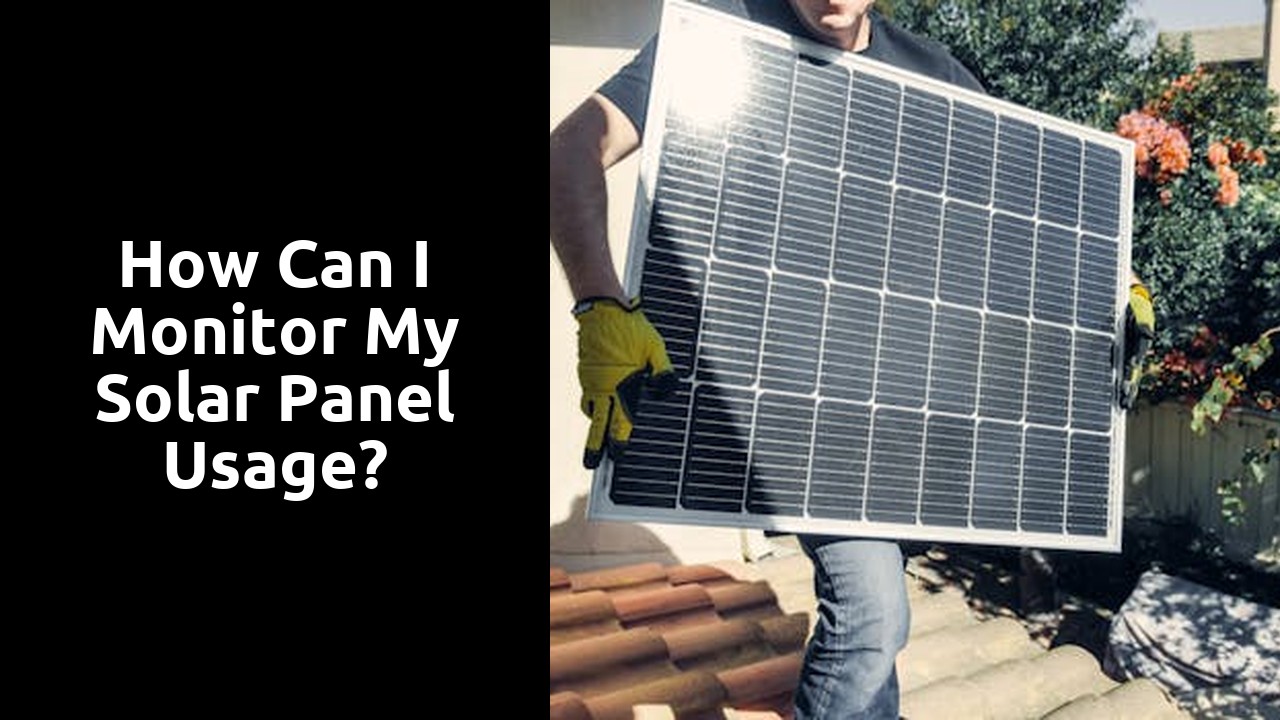
Enhancing Solar Panel Performance through Monitoring
Monitoring individual solar panels can provide valuable insights into their performance and overall efficiency. By closely tracking the output of each panel, adjustments can be made promptly to ensure optimal operation. Solar panel monitoring systems allow users to pinpoint issues such as shading, dirt buildup, or potential malfunctions that might otherwise go unnoticed. This proactive approach to maintenance can significantly increase the lifespan of the panels and maximise their energy production potential.
Furthermore, with the data obtained from solar panel monitoring, users can identify trends and patterns in energy generation that can inform decision-making processes. For example, understanding which panels are consistently underperforming can guide targeted maintenance efforts to improve their efficiency. The ability to monitor individual solar panels effectively empowers users to make informed choices regarding system upgrades, repairs, or replacements, ultimately leading to increased overall system performance and longevity.
Timely Maintenance and Repairs
Regular maintenance and prompt repairs are essential for ensuring the optimal performance and longevity of solar panels. By actively monitoring the performance of individual solar panels, issues can be identified early on, allowing for timely maintenance to avoid any significant deterioration in the system's efficiency. This proactive approach helps in not only maintaining the overall health of the solar panel system but also in maximising the energy output and return on investment. Effective Solar Panel Monitoring enables owners and operators to address any potential concerns promptly, preventing minor issues from escalating into more significant problems that may require costly repairs or replacements.
Incorporating a robust maintenance schedule supported by detailed Solar Panel Monitoring ensures that any faulty panels or components are swiftly identified and rectified. Implementing timely maintenance and repairs not only safeguards the performance of the solar panel system but also protects the investment made in renewable energy. Regular monitoring provides valuable insights into the operational status of each panel, empowering owners to address any maintenance requirements promptly and efficiently. By actively tracking and addressing issues through comprehensive Solar Panel Monitoring, individuals can maximise the efficiency and longevity of their solar energy system, ultimately optimising energy production and reducing overall maintenance costs in the long run.
Comparing Solar Panel Monitoring Solutions
When it comes to comparing different options for Solar Panel Monitoring solutions, there are various factors to consider in order to ensure efficient performance and maintenance of your solar panels. It is imperative to evaluate the level of data monitoring offered by different solutions, including real-time insights into the performance of individual solar panels, as this information can directly impact the overall efficiency of your solar energy system. Additionally, the ease of installation and user-friendliness of the monitoring technology should be taken into account to ensure a seamless integration with your existing solar panel setup.
Furthermore, cost-effectiveness plays a crucial role in determining the suitability of Solar Panel Monitoring solutions for your specific needs. While some monitoring technologies may offer advanced features, it is essential to assess whether the benefits justify the additional costs involved. A comprehensive comparison of different solutions will help you make an informed decision that aligns with your budget constraints while maximizing the performance and longevity of your solar panel system.
CostEffective Monitoring Technologies
Cost-effective monitoring technologies play a crucial role in ensuring the efficient operation of solar panel systems. By implementing cost-effective solutions for monitoring individual solar panels, users can proactively identify any issues and optimize the performance of their solar photovoltaic (PV) systems. These technologies enable real-time monitoring of key parameters such as energy production, voltage, and temperature, providing valuable insights to improve the overall efficiency of the system.
Investing in cost-effective monitoring technologies for solar panel monitoring allows users to track the performance of each individual solar panel, detect any maintenance or repair needs promptly, and maximize energy output. By leveraging these technologies, users can enhance the longevity of their solar panel systems and reduce the risk of costly downtime due to unforeseen issues. Embracing cost-effective monitoring solutions represents a proactive approach to ensuring the optimal performance and return on investment of solar energy systems.
Future Trends in Solar Panel Monitoring
Future trends in solar panel monitoring indicate a shift towards more advanced technologies and innovative solutions. The integration of Internet of Things (IoT) in solar panel monitoring systems is gaining momentum, allowing for real-time data collection and analysis to optimise the performance of individual solar panels. This level of monitoring precision can lead to significant improvements in energy output and overall efficiency of solar panel systems in both residential and commercial settings.
Cost-effective monitoring technologies are also emerging in the field of solar panel monitoring, making it more accessible for a wider range of consumers. These solutions enable users to remotely track the performance of their solar panels and receive timely alerts for any maintenance or repairs needed. By embracing these future trends in solar panel monitoring, individuals and businesses can ensure that their solar panel systems are operating at peak performance levels, maximising energy production and ultimately reducing their carbon footprint.
IoT Integration in Solar Panel Monitoring
IoT integration is revolutionizing the field of Solar Panel Monitoring, enabling real-time tracking and analysis of individual solar panels. This technology allows for granular data collection, allowing users to monitor the performance of each panel independently. With IoT integration, issues such as shading, dirt, or malfunction can be pinpointed swiftly, leading to more efficient maintenance and improved overall system performance.
Furthermore, IoT integration in Solar Panel Monitoring enhances the overall system reliability and allows for predictive maintenance. By leveraging the data collected through IoT devices, maintenance schedules can be optimized to address potential issues before they escalate, reducing downtime and maximizing energy production. This proactive approach not only prolongs the lifespan of the panels but also ensures that the system operates at its peak efficiency at all times.
FAQS
Can individual solar panels be monitored for performance?
Yes, individual solar panels can be monitored for performance using advanced monitoring technologies.
How can monitoring enhance the performance of solar panels?
Monitoring helps in identifying issues at the individual panel level, allowing for timely maintenance and maximizing overall system efficiency.
Are there cost-effective solutions available for monitoring solar panels?
Yes, there are cost-effective monitoring technologies available that enable efficient tracking of individual panel performance without significant expenses.
Why is timely maintenance and repair important for solar panels?
Timely maintenance and repairs are crucial to ensure that solar panels operate optimally and generate maximum energy output.
What are some future trends in solar panel monitoring?
Future trends include the integration of Internet of Things (IoT) technologies for real-time monitoring and data analytics to enhance solar panel efficiency.
How can comparing different monitoring solutions help in choosing the right one?
Comparing solar panel monitoring solutions based on features, cost, and effectiveness can help in selecting the most suitable option for specific needs and requirements.
